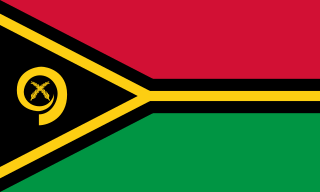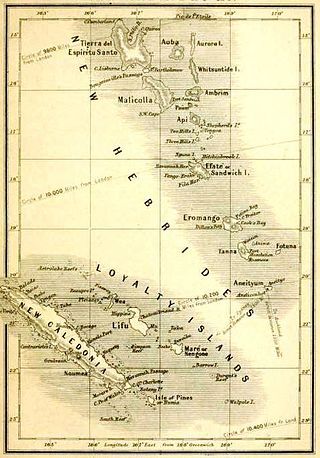
Vanuatu, officially the Republic of Vanuatu, is an island country in Melanesia, located in the South Pacific Ocean. The archipelago, which is of volcanic origin, is 1,750 km (1,090 mi) east of northern Australia, 540 km (340 mi) northeast of New Caledonia, east of New Guinea, southeast of Solomon Islands, and west of Fiji.

The history of Vanuatu spans over 3,200 years.

Melanesia is a subregion of Oceania in the southwestern Pacific Ocean. It extends from New Guinea in the west to the Fiji Islands in the east, and includes the Arafura Sea.

New Hebrides, officially the New Hebrides Condominium and named after the Hebrides Scottish archipelago, was the colonial name for the island group in the South Pacific Ocean that is now Vanuatu. Native people had inhabited the islands for three thousand years before the first Europeans arrived in 1606 from a Spanish expedition led by Portuguese navigator Pedro Fernandes de Queirós. The islands were named by Captain James Cook in 1774 and subsequently colonised by both the British and the French.

John Frum is a figure associated with cargo cults on the island of Tanna in Vanuatu. He is often depicted as an American World War II serviceman who will bring wealth and prosperity to the people if they follow him. Quoting David Attenborough's report of an encounter: "'E look like you. 'E got white face. 'E tall man. 'E live 'long South America."

Walter Hadye Lin̄i was a Raga Anglican priest and politician who was the first Prime Minister of Vanuatu, from independence in 1980 to 1991. He was born at Agatoa village, Pentecost Island. On his mother's side, he was a descendant of the high chief Virasangvulu, while on his father's side, he was descended from the famous weaver, Nuenue, as well as from the high chief Viralalau.
The Melanesian Brotherhood is an Anglican religious community of men in simple vows based primarily in the Solomon Islands, Vanuatu, and Papua New Guinea.
Frederick "Fred" Karlomuana Timakata was a Ni-Vanuatu politician who served as the president of Vanuatu from 1989 to 1994.

Ni-Vanuatu is a large group of closely related Melanesian ethnic groups native to the island country of Vanuatu. As such, Ni-Vanuatu are a mixed ethnolinguistic group with a shared ethnogenesis that speak a multitude of languages.

The Anglican Church of Melanesia (ACoM), also known as the Church of the Province of Melanesia and the Church of Melanesia (COM), is a church of the Anglican Communion and includes nine dioceses in Solomon Islands, Vanuatu and New Caledonia. The Archbishop of Melanesia is Leonard Dawea. He succeeds the retired archbishop George Takeli.
The concept of Melanesian socialism was first advocated by Father Walter Lin̄i of the New Hebrides, who became the country's first Prime Minister upon its independence from France and the United Kingdom in 1980. Lin̄i's views on socialism were inspired by Julius Nyerere's experiments in African socialism in Tanzania.

Southern Cross is the name given to each of a succession of ships serving the Melanesian Mission of the Anglican Church and the Church of the Province of Melanesia. The first ship having this name succeeded the Undine, a 21-ton schooner built at Auckland and in service from 1849 to 1857.

The French Republic and the Republic of Vanuatu have long-standing bilateral relations which have varied over the years between tense and amicable. Vanuatu, then known as the New Hebrides, was a Franco-British condominium from 1906 to 1980, and maintained formal relations with both of its former colonial masters after gaining independence. Franco–Vanuatuan relations were rocked by a series of crises in the 1980s, and broke down completely on several occasions, with Vanuatu expelling the French ambassador in 1981, in 1984 and in 1987. Relations improved from the 1990s onwards and, today, France provides development aid to Vanuatu. The two countries also share amicable economic and cultural relations; both are members of the Organisation internationale de la Francophonie.
The Archbishop of Melanesia is the spiritual head of the Anglican Church of Melanesia, which is a province of the Anglican Communion in the South Pacific region, covering the nations of Solomon Islands and Vanuatu. From 1861 until the inauguration of Church of the Province of Melanesia in 1975, the Bishop of Melanesia was the head of the Diocese of Melanesia.
The Melanesian Mission is an Anglican missionary agency supporting the work of local Anglican churches in Melanesia. It was founded in 1849 by George Selwyn, the first Bishop of New Zealand.
Sydney Gething Caulton was a British bishop who spent much of his career in New Zealand and the South Pacific.
Derek Alec Rawcliffe OBE was an English Anglican bishop and author. He served as the Bishop of the New Hebrides and the Scottish Episcopal Church's Bishop of Glasgow and Galloway.
Emae, Emwae or Mae language, is a Polynesian outlier language of Vanuatu.
Charles Welchman Ling was the inaugural Bishop of Banks and Torres.
The Diocese of Vanuatu and New Caledonia is one of the nine current dioceses of the Anglican Church of Melanesia.









